Preserving your home’s legacy whilst also adding strength to its historic structure can be a difficult and confusing task. When it comes to your roof, this often requires careful consideration of the different roof restoration materials available. Finding the right roofing material that fits with both your aesthetic aspirations, building regulations and your budget whilst also restoring your home to its original character is not the easiest of tasks. What’s more, many of the original materials are simply not in production any more and so finding a perfect match can feel near impossible.
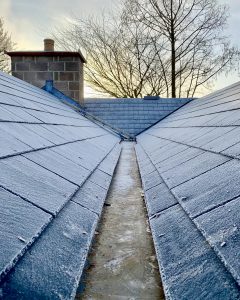 A general rule of thumb is to contact an experienced architect and experienced roofing team before making any major decisions in order to determine which materials best suit your circumstances. Whilst an architect is able to provide insights into the historical styles that will suit this major design feature, we’re on hand to provide you with some of the most common options and roof restoration materials available that offer an ideal historical look and incorporate modern construction techniques.
A general rule of thumb is to contact an experienced architect and experienced roofing team before making any major decisions in order to determine which materials best suit your circumstances. Whilst an architect is able to provide insights into the historical styles that will suit this major design feature, we’re on hand to provide you with some of the most common options and roof restoration materials available that offer an ideal historical look and incorporate modern construction techniques.
Slate
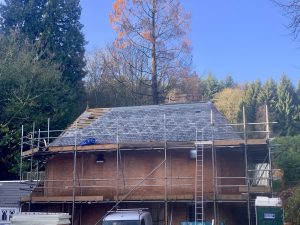 One of the most natural roofing materials available, along with wood, is slate. You’ll find a slate roof on many historic buildings in the UK. Welsh slate in particular is the number one choice when it comes to this type of roof covering. However, there are some great alternatives if you’re
One of the most natural roofing materials available, along with wood, is slate. You’ll find a slate roof on many historic buildings in the UK. Welsh slate in particular is the number one choice when it comes to this type of roof covering. However, there are some great alternatives if you’re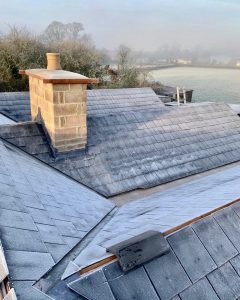 on a lower budget such as natural Spanish slate or the man made cement fibre slates which have a slate ‘grain’ added for aesthetic effect.
on a lower budget such as natural Spanish slate or the man made cement fibre slates which have a slate ‘grain’ added for aesthetic effect.
As one of the smartest and most aesthetically pleasing materials out there, slate roofs require minimal maintenance and their long-lasting durability means that your roof could survive a lifetime.
Clay Tiling
Clay was one of the earliest roofing materials and many old buildings in the UK will have man made plain clay tiles as a covering. The tiles were made using a clay oven and each tile was made individually, you’ll even sometimes see fingerprints on the ‘nibs’ (which hook over the batten) from the young kids who would have to spend their days pushing their thumbs through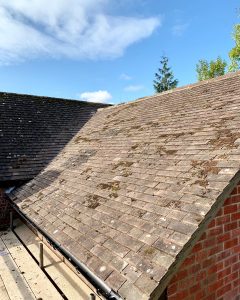 the tops of the tiles to create the hook effect of a ‘nib’.
the tops of the tiles to create the hook effect of a ‘nib’. 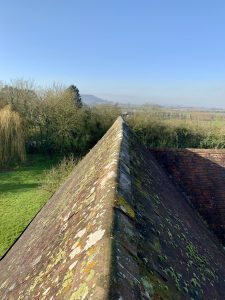
Although you can still source second hand man made plain clay tiles from reclamation yards and old farm sales, there is a newer alternative with many of the same appeals. The modern day clay tiles aren’t made in such a draconian manor and are instead factory made by machines, meaning that you can still get the great material but at a fraction of the cost. This makes them an ideal material to mimic the structure and appeal of an older roof, especially if you’re looking to restore your old roof for less.
Traditional clay tiles are available in a wide variety of shapes and sizes, meaning that finding a close or even perfect match for your home can be relatively simple, however if you need something slightly more unique, there are plenty of specialist tile manufacturers that will be able to produce your ideal tile. Like slate roofs, tiled roofs require minimal maintenance beyond checking that they have not slipped or cracked during patches of exceptionally bad weather, but instead of boring you about that now, if you’re interested, take a look at our pervious blog post about preventing storm damage.
If you’re looking for an even cheaper option yet again, look into concrete tiling, however this option may not be available for many old and historic roofs due to listed building rules.
Flat roof coverings
It may sound a little surprising but many older, historic buildings have flatter areas that require 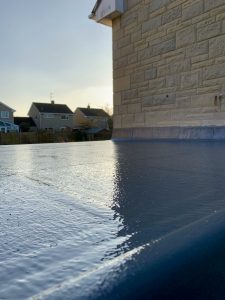 flat roofing, typically over extensions, dormers and even towers. EDPM Rubber or GRP fibreglass roofing is an ideal, cheaper option for your old roof restoration as the tight water-proofing qualities are able to protect your building’s beautiful heritage without costing an arm and a leg.
flat roofing, typically over extensions, dormers and even towers. EDPM Rubber or GRP fibreglass roofing is an ideal, cheaper option for your old roof restoration as the tight water-proofing qualities are able to protect your building’s beautiful heritage without costing an arm and a leg.
Lead Flashings
L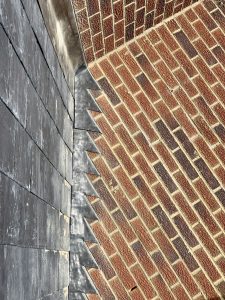 ead flashings are used in order to protect the junctions between roof
ead flashings are used in order to protect the junctions between roof 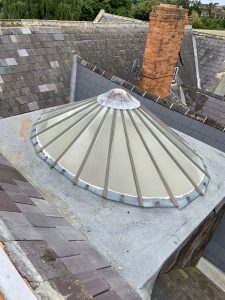 covering and the wall, for example between phatapets and chimneys.
covering and the wall, for example between phatapets and chimneys.
These are often vital for restorations where weathering over time has worn the seal, increasing the likelihood of leaks. Lead is the most effective material to use in this instance due to its ability to expand and contract with the weather, providing the ideal waterproof seal around your home.
To see more of our lead work, why not take a look at some of our latest projects here.
It is always worthwhile contacting a reputable roofing contractor before making important decisions such as this, so contact us today for a free roof inspection and quote for your next roofing project and we can guide you on the best roof restoration materials for you.
Whilst we’re at it, if you haven’t heard already we are planning a 400 mile cycle from London to Amsterdam in March in aid of Mind and we’d greatly appreciate your support! To find out more, check out our blog post or if you want to donate a few pennies, click here. Thank you!
